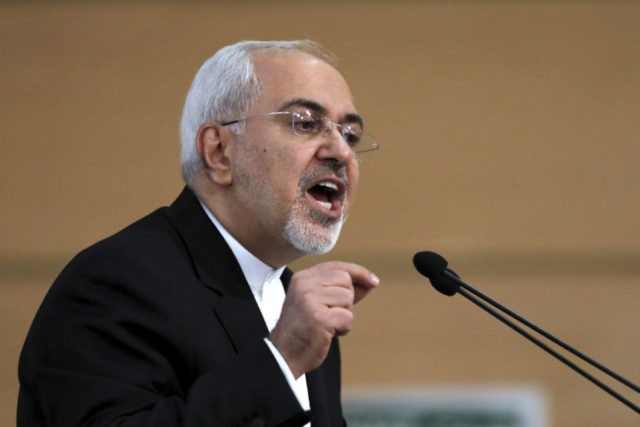Iranian Foreign Minister Mohammad Javad Zarif has claimed that the United States presents a “major challenge” to the security of the Middle East as his country faces a large-scale protest movement amid widespread civil unrest.
Addressing the second Tehran Security conference for Iran and its regional allies, Zarif said that the U.S. “continued to ignore concrete realities in the region” and appeared to blame it for the country’s current political crisis.
“The U.S. policies and its intervention in the region have been the major challenge that has fueled current crises and made them more complicated,” Zarif said on Monday, according to Iran’s Tasnim news agency. “The U.S. continues to ignore the concrete realities in the region, and persists in its destabilizing and destructive policies such as maintaining its illegal military presence in Syria.”
During his speech, Zarif also blamed “violent extremism” for insecurity in the region, mainly in reference to the Islamic State, but also pointed to “ethnic restiveness” in Syria and Iraq, as well as the ongoing civil war in Yemen as other threats to stability.
Zarif made the comments amid the ongoing street protests in Iran against the regime.
The demonstrations, which began in late December in response to rising food prices and the use of public money to fund terrorist groups such as Hezbollah, have become the largest protests in Iran since the disputed 2009 presidential election. At least 21 people have been killed so far from state-sponsored violence while officials have pledged to enforce the death penalty should cases against peaceful protesters go to trial.
Rather than rallying against the United States, protesters, mainly comprised of the country’s secular youth, have been heard chanting phrases such as “Death to the Dictator,” “Death to Rouhani,” “Don’t be afraid, we are all united,” and “Political prisoners should be freed.”
However, reports and footage from inside Iran have been limited in recent days following the government’s decision to restrict access to social media over fears that it will further empower protesters, similar to its use during the 2011 Arab Spring.
The U.S. has broadly come out in favor of the protesters, while President Donald Trump stated that they would be watching “very closely” for human rights violations.
“The United States strongly condemns the arrest of peaceful protesters. We urge all nations to publicly support the Iranian people and their demands for basic rights and an end to corruption,” the State Department said in a statement, noting that Secretary of State Rex Tillerson retains his “deep support for the Iranian people.”
Iran’s supreme leader Ayatollah Ali Khamenei has blamed the crisis on Iran’s “enemies,” presumably in reference to the United States.
“In recent days, enemies of Iran used different tools including cash, weapons, politics, and intelligence apparatus to create troubles for the Islamic Republic,” Khamenei said at an event commemorating the Iran-Iraq war last week. He said he would elaborate on his statements “when the time is right.”
Follow Ben Kew on Facebook, on Twitter at @ben_kew, or email him at bkew@breitbart.com.

COMMENTS
Please let us know if you're having issues with commenting.